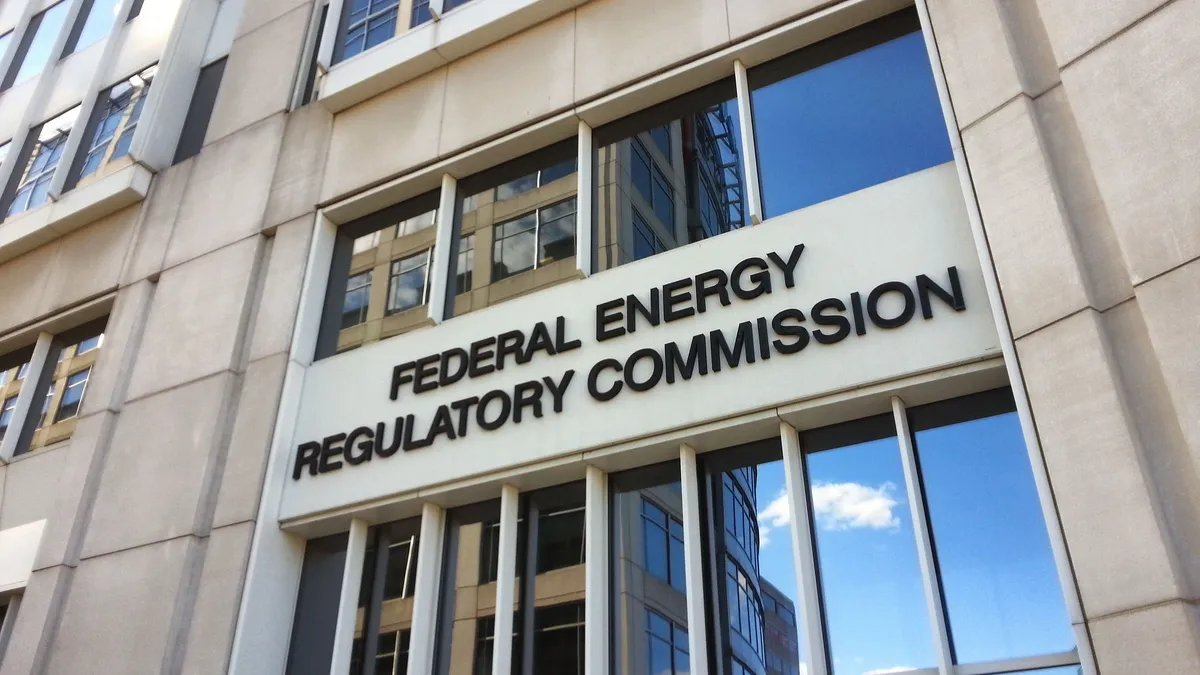Dive Brief:
-
State legislators within the PJM Interconnection are asking federal regulators to allow more flexibility in pursuing alternatives to the grid operator's capacity market, as they pursue a fix to the minimum offer price rule (MOPR) expansion.
- In comments filed Monday with the Federal Energy Regulatory Commission, 45 state legislators asked FERC to eliminate the MOPR, and in the interim revisit rules around the Fixed Resource Requirement (FRR) — an option that could, if legislatively mandated, allow utilities in some states to procure resources to meet projected future demand outside the current capacity market. New Jersey and Illinois are actively considering using the mechanism as a way to better control their resource procurement and add more clean energy resources to their power mix.
-
But using the FRR is expected to be expensive, and FERC is in the midst of a series of technical conferences that some hope will make staying in the capacity market more attractive to states with clean energy goals in the long term. As a result, PJM states are requesting FERC adjust the mechanism to make it more of a temporary solution, and to allow more flexibility in the level of capacity required to be procured through the FRR.
Dive Insight:
State unrest within wholesale capacity markets has grown in recent years alongside the rise of clean energy laws and a desire to control local electricity resources. That tension was accelerated by FERC's decision in 2019 to expand the MOPR, effectively raising the bidding price for state-subsidized resources — largely zero-emissions resources — in PJM's capacity market. Coastal states in particular fear the MOPR will impact nascent offshore wind industries.
"The expanded MOPR will prevent thousands of megawatts of offshore wind planned for Maryland, Virginia, and New Jersey from clearing in the fast-approaching capacity auctions ... It is also quite possible, if not likely, that other clean energy generation from existing nuclear plants or new solar, onshore wind, storage, distributed energy resources, or energy efficient resources, will also fail to clear," legislators wrote in their comments. "It is imperative that steps be taken to eliminate the MOPR before it prevents state policy resources from clearing in the upcoming capacity auctions."
Illinois, New Jersey and Maryland were the most vocal opponents of the rule, with each threatening to exit the capacity market through the FRR mechanism. But with new leadership at FERC, chaired by Richard Glick, who long opposed the MOPR expansion, has made Maryland decide against exiting the capacity market. Other states are still looking to exit, but want a more temporary fix to address their concerns.
"In balancing odds, it seemed to make sense" to step away from the FRR, given ongoing stakeholder conversations with PJM and Glick's apparent commitment to revisiting the MOPR ruling, said Lorig Charkoudian, D, a Maryland Delegate who is leading state legislator efforts on engaging with FERC and PJM.
"As soon as Glick became chairman we knew we were in a different world," she said. Although there "will be some damage, even with a great FERC headed in the right direction," she and other legislators "feel hopeful," which is why Maryland is no longer pursuing the FRR.
New Jersey and Illinois, however, are still pursuing the FRR option through their legislatures and "[d]iscussions in other legislatures are ongoing," according to the legislators' comments submitted to FERC. But exiting the PJM capacity market through the FRR could cost New Jersey between $32 million and $386.4 million more than the 2021/2022 capacity auction would under current rules, according to a report from PJM's independent market monitor. And for Commonwealth Edison, Illinois' dominant investor-owned utility, costs could increase by $414.4 million, according to the IMM, though in another scenario the market monitor says costs could decrease by $87.9 million.
In order to mitigate the risk of exiting the capacity market through the FRR mechanism, but keep the option on the table while the MOPR remains in effect, the group of legislators proposed FERC reform the FRR so states can have more control over how long they use the mechanism and how much capacity they procure through it.
Current FRR rules would not allow entities to re-enter the capacity market for five years after they elect to use the FRR, and requires all resources come through the FRR mechanism. But the legislators suggest FERC allow states and their utilities to procure less than 100% of their resources through the FRR, and have the ability to reenter the capacity market after one year of electing to use the FRR.
"This kind of flexibility will better enable states and local utilities to assist in the transition to a clean, resilient grid," states wrote in their comments.
The comments — filed mostly by legislators from Maryland, along with individuals from New Jersey, Indiana, North Carolina, Pennsylvania and West Virginia — are in response to an ongoing FERC proceeding, aiming to revisit the capacity market construct in order to better accommodate state clean energy goals while maintaining low costs and reliability. States also asked FERC to eliminate the MOPR,
Commissioners are hoping stakeholders will come up with answers to a series of questions about the future of wholesale capacity markets, but Glick has indicated that if there is no stakeholder consensus in time for FERC to implement a new rule ahead of PJM's December capacity auction, he would attempt to get the commission to take action unilaterally.















